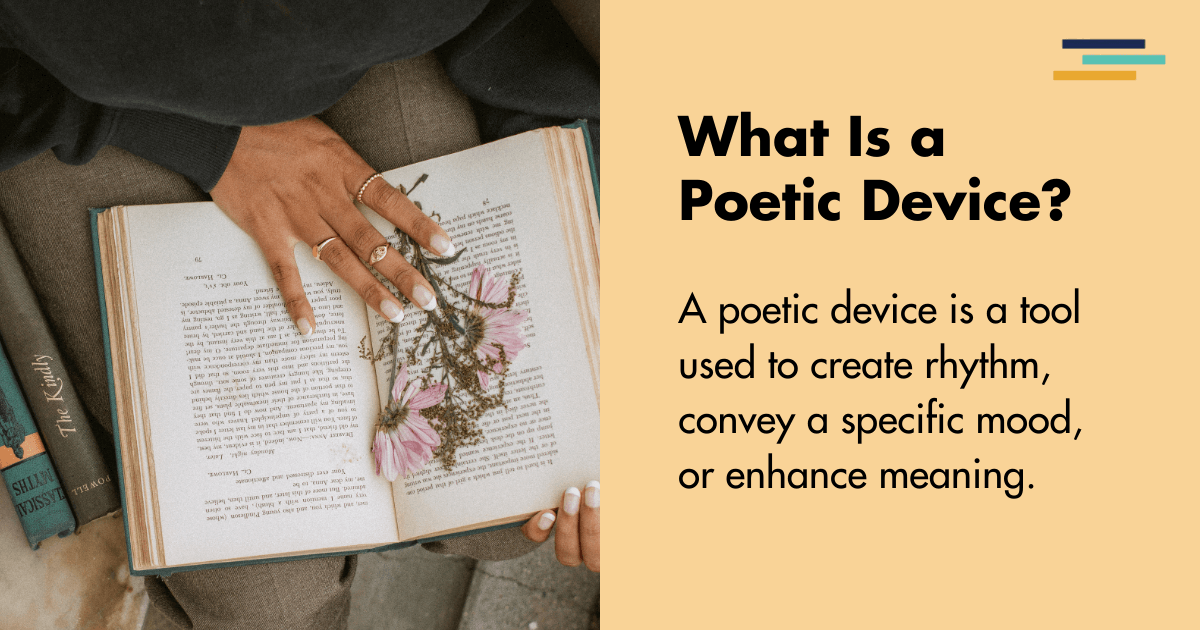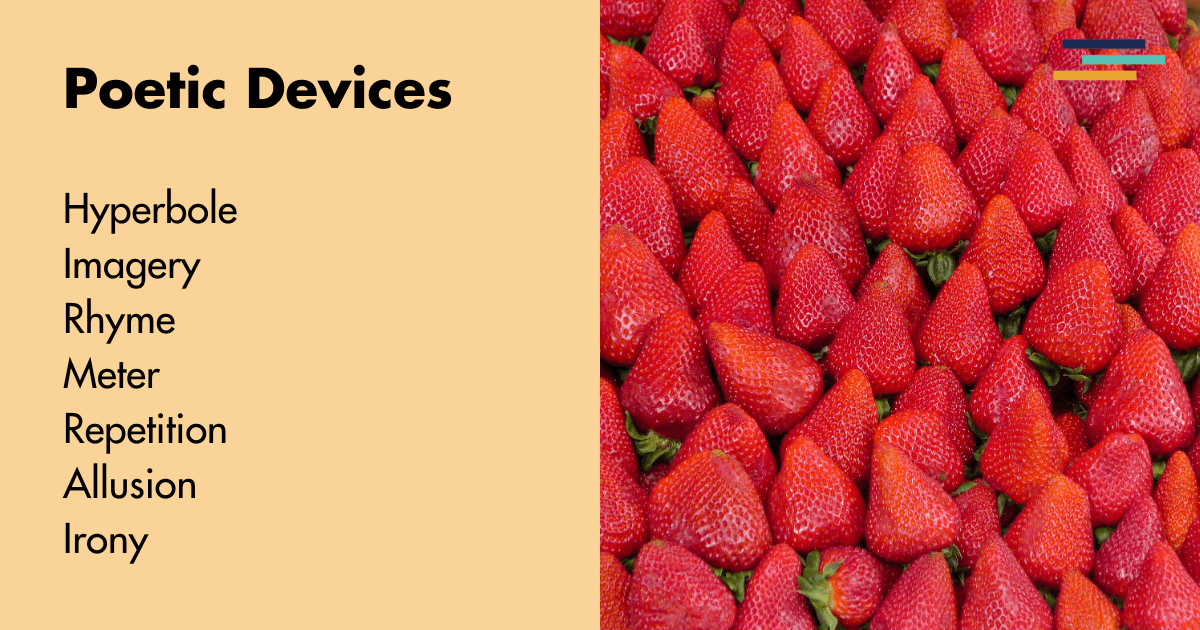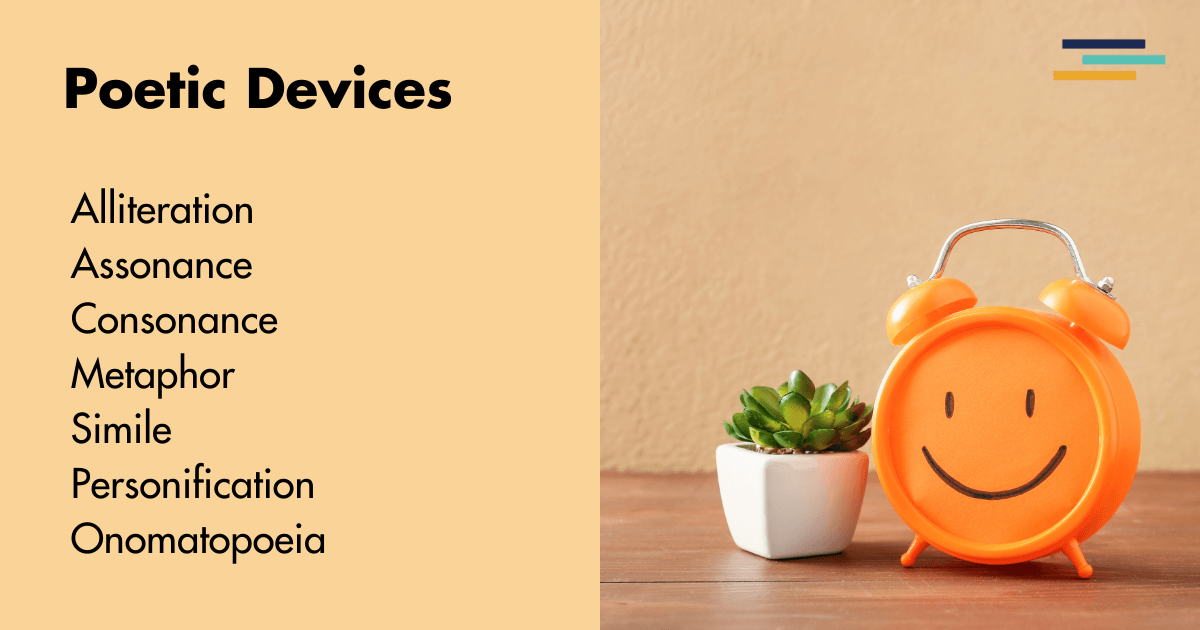
Ever wondered why some writing makes your soul sing while other prose puts you to sleep faster than a lullaby on repeat? The secret, dear word enthusiasts, lies in the mystical realm of poetic devices. These linguistic Swiss Army knives are the unsung heroes of literature, transforming mundane mumblings into magical masterpieces.
Whether you’re a budding bard, a curious bookworm, or just someone who thinks words are nifty, this article is your golden ticket to the Willy Wonka factory of wordplay.
Prepare to see language in a whole new light—sunglasses recommended, because things are about to get metaphorically dazzling: You’re diving into an article about poetic devices that’s so stuffed with poetic devices, it’s practically a turducken of literary techniques. We’ve got alliteration aplenty, similes so smooth they’ll make silk jealous, and enough personification to make your dictionary feel like it needs a therapist.
So brace yourself for a self-referential rollercoaster ride through the landscape of language, where the medium isn’t just the message—it’s also a massage for your mind!
Take a free trial of Fictionary today and take your story to the next level.
Ok, let’s get started!
What Is a Poetic Device?
From Edgar Allan Poe’s “The Raven” (where alliteration throws a word party) to Shakespeare’s sonnets (where metaphors run wild), poetic devices have been jazzing up literature since quills were cutting edge technology.
And they’re not just for dusty old poems either—you’ll find these linguistic acrobats somersaulting through novels, pirouetting in song lyrics, and even sneaking into your everyday chitchat. (Ever told someone you’re “so hungry you could eat a horse”? Congrats, you’ve just used hyperbole!)
So what exactly is a poetic device?
Picture language as a blank canvas, if you will. Now, imagine poetic devices as a set of fantastical paintbrushes, each with its own superpower. One brush adds sparkles, another creates 3D effects, and yet another makes words do backflips off the page. That, my friends, is the essence of poetic devices—linguistic tools that turn plain Jane sentences into literary supermodels.
These verbal vitamins serve multiple purposes:
- Enhancing musicality: They make your words dance the cha-cha and sing opera. Sometimes simultaneously.
- Creating imagery: They paint pictures so vivid, your readers might need to check if their books are actually TVs.
- Evoking emotions: They pluck heartstrings and tickle funny bones with the precision of a master puppeteer.
- Adding complexity: They give your writing more layers than a wedding cake made by an overachieving baker.
- Emphasizing ideas: They shine spotlights on your themes brighter than a disco ball at a rave.
Mastering these tools isn’t just about impressing your English teacher (though that’s a nifty side effect). It’s about unleashing your inner word wizard. Whether you’re penning the next great American novel, crafting a heartfelt haiku, or just trying to make your work emails less snooze-worthy, poetic devices are your trusty sidekicks in the battle against boring writing.
So, sharpen your quills (or charge your laptops), and get ready to explore the nooks and crannies of language. We’ll uncover the tricks that make alliteration alluring, metaphors mesmerizing, and personification positively perplexing. Whether you’re a seasoned wordsmith or a curious newcomer to the world of writing, there’s something here for everyone.
In the following sections, we’ll serve up some of our favorite poetic devices, complete with definitions and examples. We’ll also share tips on how to wield these linguistic weapons without accidentally poking someone’s eye out (metaphorically speaking, of course).
Ready to transform your writing from meh to magnificent? Let’s embark on this literary adventure!
Just remember—with great poetic power comes great responsibility. Use your newfound skills wisely, or you might find yourself speaking in iambic pentameter at the grocery store. And trust us, no one wants to hear a sonnet about choosing the perfect avocado.
Actually, a sonnet about avocados sounds pretty nifty.

15 Poetic Devices with Examples
Imagine a world where words don’t just sit on the page—they dance, they sing, they paint pictures in your mind. That’s the magic of poetic devices. They’re the secret ingredients that turn ordinary sentences into literary feasts, and we’re about to raid the pantry!
Are you ready to see your words transform from caterpillars to butterflies? To watch your paragraphs pirouette and your chapters cha-cha? Then let’s dive into the dazzling world of poetic devices. Your journey to becoming a literary legend starts here!
Alliteration (The Tongue Twister’s Delight)
Definition: The repetition of initial consonant sounds in neighboring words. It’s like a linguistic conga line for your mouth!
Example: “Peter Piper picked a peck of pickled peppers.”
(Poor Peter. Has anyone checked if he’s okay? That’s a lot of peppers.)
Fun fact: Alliteration is the secret weapon of comic book creators. Just ask Peter Parker, Bruce Banner, or Lois Lane!
Assonance (Vowel Harmony for Word Nerds)
Definition: The repetition of similar vowel sounds in nearby words. It’s like your words are having a karaoke night!
Example: “Light bright night”
(The ‘i’ sound is really having its moment here, isn’t it?)
Pro tip: Use assonance to make your poetry flow smoother than a buttered eel sliding down a waterslide.
Consonance (The Repeated Rhythm of Rhetoric)
Definition: The repetition of consonant sounds within words. It’s like a secret handshake for your sentences.
Example: “Pitter-patter, pitter-patter”
(Is it raining, or is there a tap-dancing mouse in the house?)
Warning: Excessive use may result in tongue-tying and uncontrollable urges to become a beat poet.
Metaphor (The Shapeshifter of Speech)
Definition: A comparison between two unlike things without using “like” or “as.” It’s linguistic alchemy, turning the ordinary into gold!
Example: “Life is a roller coaster.”
(Complete with unexpected loops, screaming, and the occasional need for a barf bag.)
Remember: Choose your metaphors wisely. “Life is a box of chocolates” sounds much more appealing than “Life is a public restroom.”
Simile (Metaphor’s More Obvious Cousin)
Definition: A comparison between two unlike things using “like” or “as.” It’s the linguistic equivalent of pointing and saying, “See? See?”
Example: “Her voice is as smooth as silk.”
(As opposed to “as smooth as sandpaper,” which is a whole different story.)
Caution: May cause sudden outbreaks of clarity and understanding. Use responsibly.

Personification (Bringing Inanimate Objects to Life—No Mad Science Required!)
Definition: Attributing human characteristics to non-human things. It’s like playing dress-up with the entire universe!
Example: “The wind whispered through the trees.”
(Let’s hope it’s not spreading gossip. Those trees can’t keep a secret to save their lives.)
Side effect: May result in talking to your houseplants more than your human friends.
Onomatopoeia (Words That Go Boom, and Fizz, and Swoosh)
Definition: Words that phonetically imitate the sound they describe. It’s like verbal cosplay for your sentences!
Example: “The bees buzz busily.”
(Fun fact: If you say this three times fast, a swarm of bees might actually appear. Proceed with caution.)
Warning: Excessive use may result in people mistaking you for a walking sound effects machine.
Hyperbole (Because Sometimes the Truth Just Isn’t Dramatic Enough)
Definition: An exaggeration used for emphasis or effect. It’s the drama queen of the literary world!
Example: “I’ve told you a million times.”
(Fact check: Unless you’re several centuries old and have nothing better to do, this is probably not accurate.)
Pro tip: Use hyperbole when the truth is boring. “I waited forever” sounds much more exciting than “I waited for 7 minutes and 36 seconds.”
Imagery: Painting Pictures with Words (No Actual Paint Required)
Definition: Vivid descriptive language that appeals to the senses. It’s like Instagram filters for your brain!
Example: “The sun-warmed peach felt like velvet against my fingertips, its sweet aroma filling the air”
(Warning: This description may cause sudden cravings for peaches and/or velvet.)
Side effect: May lead to vivid daydreams and an inexplicable desire to lick your Kindle.
Rhyme (Making Words Play Nice Together)
Definition: The repetition of similar sounds at the end of words. It’s like matchmaking for syllables!
Example: “Twinkle, twinkle, little star / How I wonder what you are”
(Spoiler alert: It’s a giant ball of burning gas. But that doesn’t rhyme as well, does it?)
Caution: Addictive. May lead to spontaneous limerick outbursts in public places.
Meter (The Rhythmic Heartbeat of Poetry)
Definition: The rhythmic structure of a poem, often based on stressed and unstressed syllables. It’s like a linguistic dance party!
Example: Shakespeare’s iambic pentameter: “Shall I compare thee to a summer’s day?”
(Shakespeare: making your love life sound fancy since 1592.)
Fun fact: Mastering meter gives you the superpower to tap your foot to any poem. Use this power wisely.
Repetition (Because If You Say It Once, Why Not Say It Again?)
Definition: The deliberate use of words, phrases, or ideas multiple times for emphasis. It’s like a verbal echo chamber!
Example: “I have a dream” in Martin Luther King Jr.’s famous speech
(He had a dream, folks. And it wasn’t about showing up to school in his underwear.)
Warning: May cause earworms. Use sparingly unless you want your words stuck in people’s heads for days.
Allusion (The Inside Joke of the Literary World)
Definition: A reference to a well-known person, place, event, or work of art. It’s like dropping Easter eggs in your writing!
Example: “He was a real Romeo”
(Hopefully without the tragic ending. Let’s aim for “Romeo minus the family feud and poison” vibes.)
Pro tip: Use allusions to make yourself sound smart at parties. Just make sure your audience gets the reference, or you’ll end up explaining jokes. Awkward.
Irony (When Words Say “Zig” But Mean “Zag”)
Definition: The use of words to convey a meaning opposite to their literal sense. It’s the poker face of literary devices!
Example: Saying “Oh, great!” when something goes wrong
(Because nothing says “This is terrible” quite like pretending it’s wonderful.)
Caution: May cause eye-rolling in literal-minded individuals. Use with a healthy dose of sarcasm.
Symbolism (Where Everything Means Something Else)
Definition: The use of symbols to represent ideas or qualities. It’s like a secret code for literature nerds!
Example: A dove representing peace
(Because nothing says “cease fire” like a bird that poops on statues.)
Warning: May lead to overthinking every object in your vicinity. Suddenly, that pencil isn’t just a pencil anymore, it’s a metaphor for the fragility of human knowledge. Deep, right?

How to Use Poetic Tools
So, you’ve got your poetic devices all shiny and ready to go. But how do you use them without sounding like you swallowed a thesaurus?
- Start small, dream big: Don’t try to cram every device into one sentence. That’s like trying to fit an entire wardrobe into a fanny pack. Start with one or two devices and build from there. Remember, you’re aiming for Shakespeare, not Dr. Seuss on steroids.
- Know your audience: Using allusions to obscure 18th-century Romanian poetry might impress your literature professor, but it’ll leave your romance novel readers scratching their heads. Know who you’re writing for, unless your goal is to confuse and alienate. In that case, go wild!
- Practice makes perfect(ish): Like any art form, using poetic devices takes practice. Don’t expect to wake up one day writing like Maya Angelou. Start by peppering your grocery lists with metaphors. “Eggs (the fragile orbs of potential)” has a nice ring to it, doesn’t it?
- Mix and match: Poetic devices are like spices. A pinch of alliteration here, a dash of imagery there, and suddenly your writing is a literary feast. Just don’t overdo it, or you’ll end up with the written equivalent of a curry that’s 90% turmeric.
- Read, read, and then read some more: The best way to learn how to use poetic devices is to see how the masters do it. Read widely and shamelessly steal—er, we mean “get inspired by”—techniques you admire.
- Don’t force it: If you’re trying so hard to use a device that your brain starts to hurt, step back. Forced metaphors are about as pleasant as forced laughter at your uncle’s bad jokes. Let it flow naturally.
- Revise with ruthlessness: Your first draft might look like a poetic device explosion. That’s okay! Writing is rewriting. Go back and cut the devices that don’t serve the piece. Be a gold miner, not a hoarder.
- Remember the purpose: Poetic devices are tools, not the end goal. They should enhance your message, not obscure it. If your reader is more focused on your clever alliteration than your actual point, you might need to dial it back a notch.
- Break the rules: Once you know the rules, feel free to break them. Sometimes a well-placed mixed metaphor or an intentionally overused device can be just the ticket. Just make sure it’s intentional, not a happy accident.
- Have fun with it: Writing should be enjoyable, not a chore. Play with words, experiment with devices, and don’t be afraid to be a little silly. Some of the best writing comes from a place of joy and playfulness.
Remember, dear word-wranglers, poetic devices are your friends. They’re here to help you express yourself, not to make your life difficult. Use them wisely, use them well, and who knows? You might just be the next literary sensation. At the very least, you’ll be able to write birthday cards that make people cry (in a good way).
Now go forth and sprinkle your prose with the magic dust of poetic devices. Just don’t inhale too much of it, or you might start speaking in iambic pentameter. And trust us, that gets old real fast.
List of Poetic Devices Conclusion
Well, dear wordsmiths and language lovers, we’ve journeyed through the whimsical world of poetic devices, from the alliterative plains to the metaphorical mountains. We’ve laughed, we’ve learned, and hopefully, we haven’t scared you off from ever writing again.
So, what have we discovered on this literary expedition? That poetic devices are more than just fancy terms to impress your English teacher. They’re the spice that transforms your writing from meh to marvelous, from blah to brilliant.
These linguistic acrobats—from personification to hyperbole, from onomatopoeia to symbolism—are the tools that can help you paint pictures with words, evoke emotions stronger than a double espresso, and create rhythms smoother than a jazz saxophone solo.
But remember, with great power comes great responsibility. (Yes, that was an allusion. See what we did there?) Don’t go overboard and turn your writing into a circus of poetic devices. Use them wisely, like a chef uses spices—to enhance, not overpower.
As you go forth into the world, armed with your new knowledge of assonance and irony, we encourage you to experiment. Play with words. Have fun with language. Don’t be afraid to make mistakes—some of the best metaphors come from happy accidents. (Just ask the person who first said “it’s raining cats and dogs.” We bet they didn’t expect that one to stick.)
Whether you’re crafting the next great American novel, penning a heartfelt poem, or just trying to make your work emails a little less boring, these poetic devices are now part of your literary arsenal. Use them to inspire, to provoke thought, to make people laugh, or simply to make your writing sing.
And if all else fails, remember: when in doubt, throw in a simile. It’s as easy as pie. (See? We’re doing it already.)
Now go forth and conquer the literary world, one poetic device at a time. Who knows? The next time you hear someone say, “That writing is pure poetry,” they might just be talking about yours.
Class dismissed, wordsmiths. May your metaphors be mighty, your alliterations audacious, and your readers thoroughly entertained. Write on!
Next Steps: Take a free trial of Fictionary
If you love words as much as we do, you’ll love Fictionary’s story structure software and unlimited writing courses. Make sure your story is hitting all the right beats!
Take a free trial of Fictionary today and take your story to the next level.


